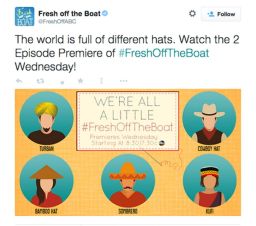Story highlights
Upcoming ABC sitcom 'Fresh Off The Boat' draws fire after tweet depicting racist stereotypes
Story creator Eddie Huang said tweet was "plain offensive" and asked for it to be deleted
ABC’s “Fresh Off The Boat,” the first sitcom to feature an Asian American family in two decades, has run into renewed controversy a week before its debut.
While the show has been praised for its potential to rebut stereotypes, its social media team flubbed when it tweeted a graphic featuring caricatures of different races underneath the phrase “We’re all a little #FreshOffTheBoat.”

If anything, the ad reinforced tired imagery: One Asian figure wore a pointy bamboo hat; another Latino figure wore a sombrero with a curly mustache.
Story creator Eddie Huang, whose memoirs the sitcom is based on, was furious.
“This is plain offensive and ridiculous,” he tweeted. “Someone please reverse this… at least they didn’t do the Native American with chicken pox blankie lol”
“Point isn’t whether we in fact wear kufis and rice hats but it’s reductive,” he added.
Wall Street Journal columnist Jeff Yang, whose son Hudson stars in the series, tweeted that the ad was “awful.”
The controversy came just weeks after Huang publicly slammed the show’s producers in a lengthy New York Magazine piece, accusing the network of distorting his memoir into a “cornstarch story about Asian-Americans resembling moo goo gai pan” in order to make it more appealing to white audiences.
But he later backed off the comments in a panel discussion on the issue, saying he didn’t have a problem with the show’s executive producer and felt his memoir, published in 2013, was portrayed “fairly.”
There was also an awkward moment at the discussion when a journalist asked the show’s cast whether the sitcom would involve “chopsticks.”
Why ‘fresh off the boat’ is a loaded term
The ad also restarted online debate over another contentious part of the sitcom: its name.
The phrase “fresh off the boat,” typically shortened to the acronym “fob,” is a loaded phrase many young American immigrants will recognize.
Depending on who you ask, it’s either a slang term or a slur used to label minorities, often Asian American, who haven’t fully assimilated with the mainstream.
Huang deals with the term in his memoir – also named “Fresh Off The Boat” – recalling a moment he heard it being used to insult his father.
“He never forgot it,” he writes. “We weren’t Americans like everyone else. We’d always be the other in this bullshit country.”
Arissa Oh, a history professor at Boston College, says the term is painful because “it aligns with Asian Americans always having to negotiate the fear of being perceived as a perpetual foreigner. Because the consequences can be anything from bullying and ostracism, to violence or internment.”
But Huang and Yang have argued that naming the show “Fresh Off The Boat” is an expression of immigrant pride, and can help to “reclaim” the term as something positive.
“It’s a term whose claws should and can be removed,” Yang tells CNN. “But only if we have an honest and open discussion about what it means to be American, and why a nation of immigrants remains so hostile toward those who are newly arrived.”
Doubt remains
Concerns over the phrase aren’t new. When the show was announced last May, some Asian Americans worried openly – what if the show inadvertently encourages people to toss the phrase around in an offensive way?
What if, instead of deepening America’s understanding of the immigrants’ difficulties, the show simply gives people another opportunity to mock them?
Perhaps, some argue, these thorny issues only get harder to untangle when they’re thrust into the mainstream.
As Oh explains, “I sort of feel like ‘fob’ is a family issue, you know – like internal to Asian Americans? We need to reclaim it or something first before we put it out there in front of other people.”
But the show is stepping into the spotlight next week. And even its strongest supporters are nervous.
“We’re all hoping that this works,” says Yang. “Because 20 years of wandering in the wilderness is damn well enough.”



